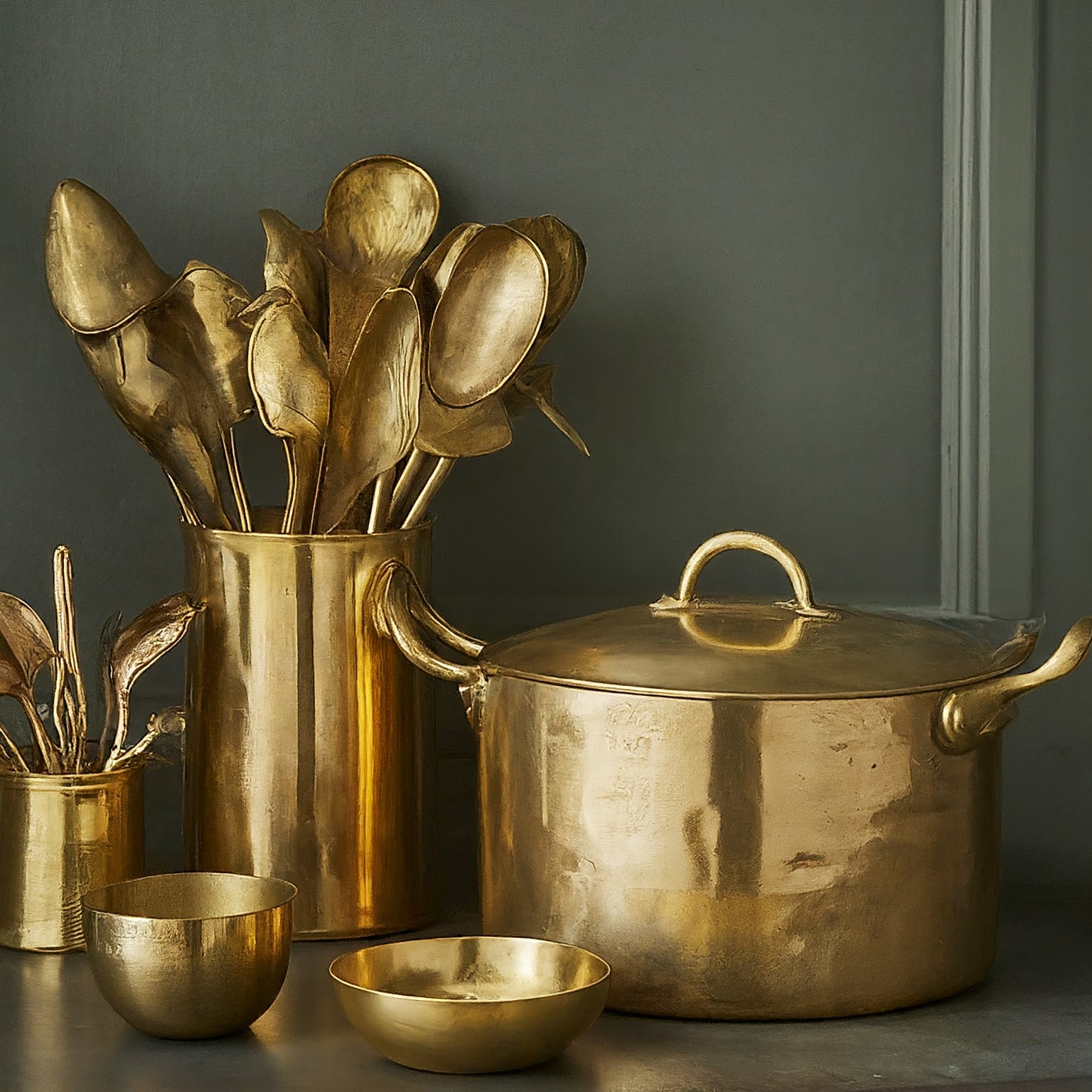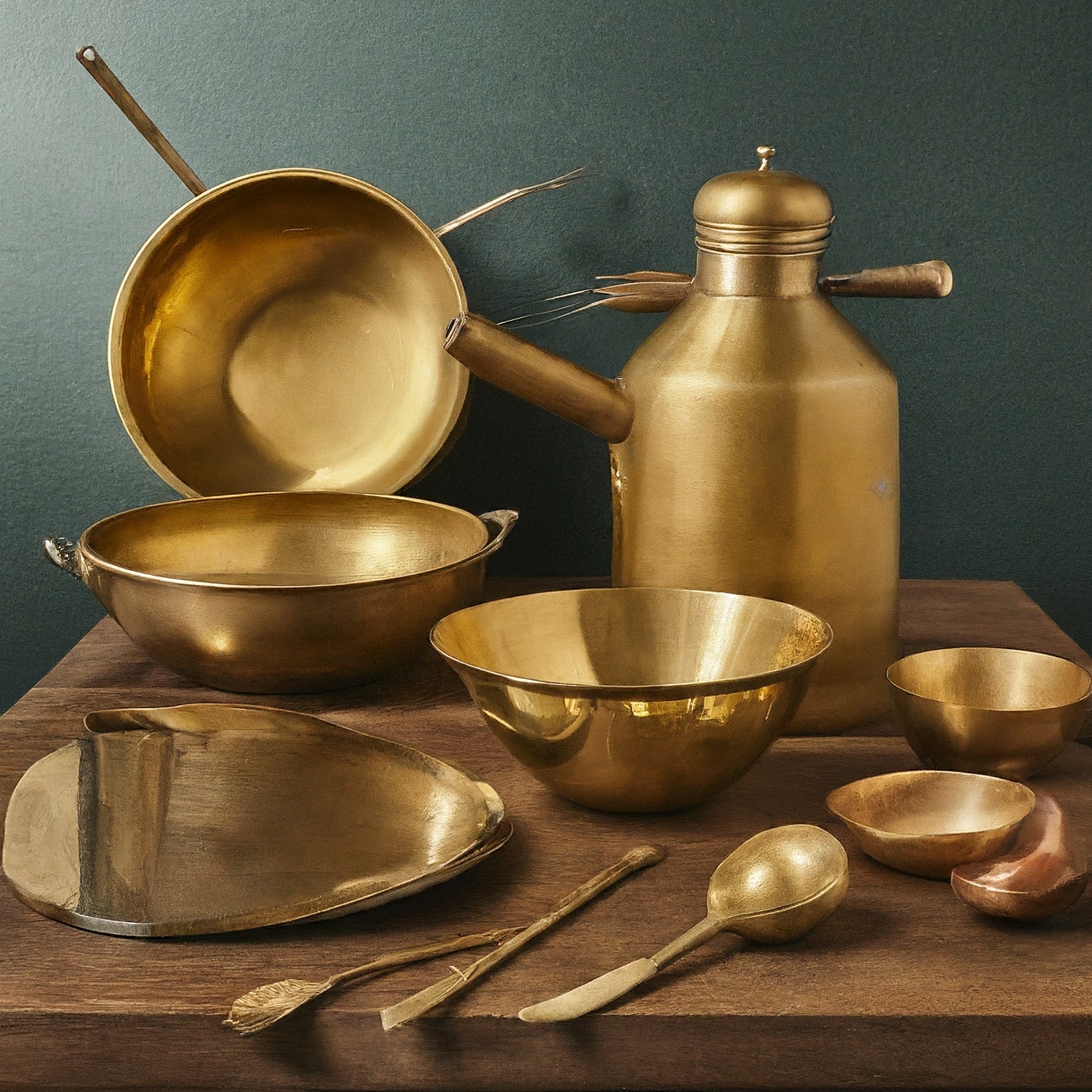Discover the 2024 Ultimate Guide: Celebrating the Safety, Advantages, Usage Tips & Variety of Brass Utensils for Cooking!
Outline of the Article
- Introduction to Brass Utensils
- What are brass utensils?
- Historical significance
- Safety of Using Brass Utensils for Cooking
- Health considerations
- Potential risks
- Myth debunking: addressing common misconceptions
- Advantages of Using Brass Cookware
- Heat conductivity and distribution
- Longevity and durability
- Antimicrobial properties
- Environmental sustainability
- How to Use Brass Cookware Safely
- Seasoning brass utensils for optimal performance
- Choosing the right cooking methods
- Cleaning and maintenance techniques
- Different Types of Brass Utensils
- Traditional vs. modern brass cookware
- Specialized brass kitchen accessories
- Unique regional variations
- Conclusion

Brass utensils have adorned kitchens for centuries, embodying a fusion of tradition, craftsmanship, and utility. In this comprehensive guide, we delve into the safety, advantages, usage tips, and varieties of brass cookware, debunking myths and shedding light on the unparalleled benefits they offer.
Introduction to Brass Utensils
Brass utensils, crafted from an alloy of copper and zinc, have been prized possessions in households worldwide. Beyond their culinary function, they symbolize cultural heritage and artisanal excellence. Dating back to ancient civilizations, brass utensils have retained their allure, standing as testaments to both practicality and aesthetics.
Safety of Using Brass Utensils for Cooking
Contrary to popular misconceptions, brass utensils are safe for cooking when handled correctly. While concerns regarding lead content persist, modern manufacturing practices have significantly minimized such risks. In fact, brass cookware boasts antimicrobial properties, inhibiting bacterial growth and enhancing food safety. It’s imperative to source from reputable suppliers and ensure proper maintenance to mitigate any potential hazards effectively.
Advantages of Using Brass Cookware
The allure of brass cookware extends beyond its safety profile. Renowned for its exceptional heat conductivity and distribution, brass facilitates precise temperature control, resulting in evenly cooked meals with enhanced flavors. Moreover, its inherent durability ensures longevity, making brass utensils cherished heirlooms passed down through generations. Additionally, brass exhibits antimicrobial properties, fostering hygienic food preparation environments. From an environmental standpoint, brass is a sustainable choice, offering recyclability and minimal ecological footprint.
How to Use Brass Cookware Safely
To optimize the performance and longevity of brass cookware, certain practices are paramount. Seasoning brass utensils before initial use forms a protective patina, safeguarding against corrosion and enhancing non-stick properties. When cooking, prioritize gentle heat settings to prevent rapid metal degradation and maintain food integrity. After use, employ gentle cleaning techniques using mild detergents to preserve the luster and integrity of brass surfaces.
Different Types of Brass Utensils
Brass utensils encompass a diverse array of options, catering to varied culinary preferences and cultural traditions. Traditional brass cookware, ranging from pots and pans to ladles and spatulas, embodies time-honored craftsmanship and functionality. Conversely, modern interpretations introduce innovative designs and functionalities, seamlessly blending tradition with contemporary aesthetics. Regional variations further enrich the landscape, with distinct styles and embellishments reflecting local customs and culinary practices.

Conclusion
In conclusion, brass utensils stand as timeless companions in the culinary realm, offering unparalleled safety, performance, and aesthetic appeal. By dispelling myths, embracing innovation, and adhering to best practices, enthusiasts can harness the full potential of brass cookware, elevating their gastronomic endeavors to new heights of excellence.
FAQs
- Are brass utensils safe for cooking?
- Yes, brass utensils are safe for cooking when sourced from reputable suppliers and maintained properly.
- How do I season brass cookware?
- Season brass cookware by coating it with oil and heating it to create a protective patina before initial use.
- Can brass cookware enhance food safety?
- Yes, brass cookware possesses antimicrobial properties that inhibit bacterial growth, promoting hygienic food preparation.
- What are the environmental benefits of using brass utensils?
- Brass utensils are sustainable choices, offering recyclability and minimal ecological footprint compared to other materials.
- Are there different styles of brass utensils available?
- Yes, brass utensils come in various styles, ranging from traditional designs to modern interpretations, each reflecting cultural nuances and preferences.
- Are brass utensils safe for cooking?
- Product on sale
 Set of 3 Brass Patilas / Milk Topias (1L, 3L, 5L)Original price was: ₹12,899.00.₹12,294.00Current price is: ₹12,294.00.
Set of 3 Brass Patilas / Milk Topias (1L, 3L, 5L)Original price was: ₹12,899.00.₹12,294.00Current price is: ₹12,294.00. - Product on sale
 Brass Roti Tawa with Insulated handle And Ghee Pot ComboOriginal price was: ₹6,230.00.₹5,655.00Current price is: ₹5,655.00.
Brass Roti Tawa with Insulated handle And Ghee Pot ComboOriginal price was: ₹6,230.00.₹5,655.00Current price is: ₹5,655.00. - Product on sale
 Set of 2 Brass Saucepans with Insulated handles (1.2L, 1.8L)Original price was: ₹5,350.00.₹4,950.00Current price is: ₹4,950.00.
Set of 2 Brass Saucepans with Insulated handles (1.2L, 1.8L)Original price was: ₹5,350.00.₹4,950.00Current price is: ₹4,950.00. - Product on sale
 Brass Urli In A Gift BoxOriginal price was: ₹4,400.00.₹3,955.00Current price is: ₹3,955.00.
Brass Urli In A Gift BoxOriginal price was: ₹4,400.00.₹3,955.00Current price is: ₹3,955.00. - Product on sale
 Chai Starter Kit (Brass Saucepan with Insulated handle + Brass Mortar and Pestle)Original price was: ₹5,510.00.₹4,989.00Current price is: ₹4,989.00.
Chai Starter Kit (Brass Saucepan with Insulated handle + Brass Mortar and Pestle)Original price was: ₹5,510.00.₹4,989.00Current price is: ₹4,989.00. - Product on sale
 Naav brass diya (set of 4) in Ivory gift boxOriginal price was: ₹2,950.00.₹2,323.00Current price is: ₹2,323.00.
Naav brass diya (set of 4) in Ivory gift boxOriginal price was: ₹2,950.00.₹2,323.00Current price is: ₹2,323.00. - Product on sale
 Set of 3 Brass Kadhais with Glass Lid (1.5L round base, 3L round base, 3L flat base)Original price was: ₹16,210.00.₹15,949.00Current price is: ₹15,949.00.
Set of 3 Brass Kadhais with Glass Lid (1.5L round base, 3L round base, 3L flat base)Original price was: ₹16,210.00.₹15,949.00Current price is: ₹15,949.00. - Product on sale
 Brass Dosa Tawa with Insulated handles And Brass Ghee Pot ComboOriginal price was: ₹5,999.00.₹5,399.00Current price is: ₹5,399.00.
Brass Dosa Tawa with Insulated handles And Brass Ghee Pot ComboOriginal price was: ₹5,999.00.₹5,399.00Current price is: ₹5,399.00. - Product on sale
 Brass Essentials Combo Set (Brass Roti Tawa with Insulated handle, Brass Ghee Pot, Brass Kadhai with Insulated handles & Glass lid)Original price was: ₹9,400.00.₹8,989.00Current price is: ₹8,989.00.
Brass Essentials Combo Set (Brass Roti Tawa with Insulated handle, Brass Ghee Pot, Brass Kadhai with Insulated handles & Glass lid)Original price was: ₹9,400.00.₹8,989.00Current price is: ₹8,989.00.


